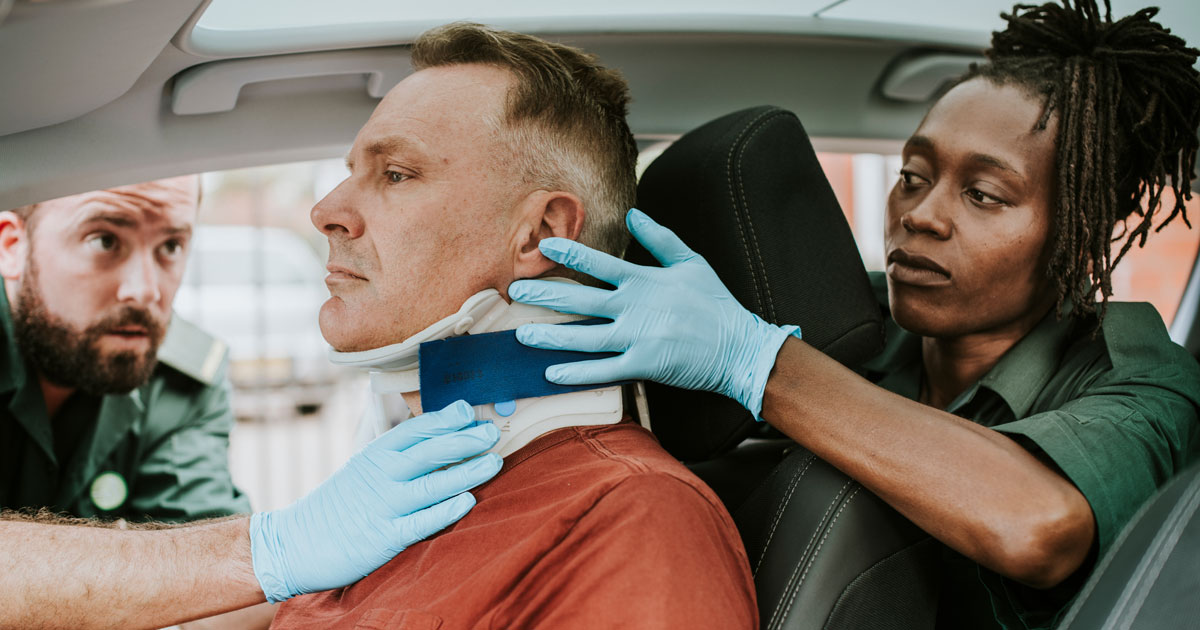When you think about car accident injuries, broken bones, whiplash, and lacerations often come to mind. However, there is another type of accident injury that can cause severe and permanent impairment: nerve damage.
You can think of the nervous system as your body’s command center. A nerve is a bundle of fibers that receives and sends messages between the body and the brain. The messages are sent by chemical and electrical changes in the neurons that make up the nerves. Without nerves, the body would not function properly. When nerves are damaged, the functions the nerves control are also damaged.
The body contains three main types of nerves:
- Motor nerves: Motor nerves allow humans to move. They send impulses to the brain, allowing people to walk, run, sit, and stand. Damage to motor nerves can cause problems with mobility and cause cramps, muscles weakness, and spasms.
- Sensory nerves: Sensory nerves send impulses from muscles to the spinal cord and brain, enabling the person to know if something is hot, cold, hard, soft, rough, or smooth. Damage to sensory nerves can result in chronic pain, touch sensitivity, tingling, and numbness.
- Autonomic nerves: Autonomic nerves control involuntary bodily functions, such as blood pressure, heart rate, digestion, and other processes. Damage to them can result in a variety of serious conditions.
In a car accident, nerve damage can occur anywhere in the body. If you suspect you have nerve damage, see a medical professional immediately. The longer you wait, the more damage you might endure.
What Causes Nerve Damage in a Car Accident?
Nerve damage can happen anywhere on the body in a car accident, but common locations include:
- Lower back.
- Middle back.
- Feet.
- Legs.
- Hands.
- Neck.
- Arms.
Compression, internal injuries, and inflammation can cause pressure on nerves and lead to damage. The following are common car accident injuries:
- Whiplash: Whiplash is a common car accident injury that involves nerves. With whiplash, a person’s head is suddenly and forcefully moved forward then backward, stretching, and pinching the nerves in the head and neck.
- Lacerations: Nerve damage can also come from lacerations sustained in a car accident. Broken glass or other objects can cut the skin, potentially damaging or severing nerves.
- Neck injuries: Any damage to the cervical, spine, or neck muscles can put pressure on nearby nerves. Nerves then become pinched or compressed, impairing their ability to function well.
- Herniated disc: Also known as a slipped disc, a herniated disc can occur in the neck or back due to the violent twisting of your body in a car accident. A herniated disc can damage nearby nerves.
- Pinched nerve: Whiplash, herniated discs, and other injuries can lead to pinched nerves. Many nerve injuries are not visible and may not show up right away. For example, when a person experiences blunt force trauma in an accident, their nerves could be stretched or compressed. It can takes hours for the swelling to cause pressure on the nerves and cause pain. For this reason, it is always best to seek medical attention after an accident.
What Are the Symptoms of Nerve Damage?
There are many symptoms of nerve damage to look for immediately after an accident, including:
- Paralysis.
- Numbness.
- Tingling and prickling.
- Shooting or radiating pain.
- Difficulty controlling bodily functions and movements.
- Muscle weakness.
- Chest pain.
- Constipation.
- Dizziness.
- Dry eyes.
- Chronic pain.
These symptoms could appear quickly or hours or days later. If you have been in a car accident and something in your body feels abnormal, do not ignore the symptoms. There is a good chance that any symptom, even weeks later, can be attributed to the accident.
How Is Nerve Damage Diagnosed and Treated?
Always get a thorough check-up by your doctor after an accident, assuming you are not immediately transported to the hospital. Catching nerve damage early can potentially lessen damage. A doctor will perform a complete physical exam. They will also most likely use diagnostic tools to test reflexes, sensations, coordination, and strength. They may perform neurological exams to test nerve function and electrical activity in muscles. Your doctor may order an imaging scan to ensure there are no internal injuries.
Once diagnosed, your doctor or specialist will recommend a treatment plan. This plan could include additional visits to a neurologist or orthopedic doctor. From there, physical therapy, medications, medical equipment, and other treatments may be recommended. Severe damage, such as paralysis and acute muscle or disc damage, may require surgeries and specialized therapies.
How Will Nerve Damage Affect My Life?
Damage from nerve injuries can be minor or serious, short-term or long-term. When nerve damage can be repaired or at least lessened, you will most likely need to plan your life around recuperating. There will be doctor visits, physical therapy, and other rehabilitation efforts. Some of these may be long-term, affecting your ability to work or work in the same capacity you were before the accident.
You may also need to stay in a rehabilitation facility for some time before being able to go home. Once home, you may need to hire help with daily activities, such as driving, cleaning, bathing, preparing meals, and shopping.
Sometimes, nerve damage is permanent, such as when it causes partial or total paralysis after an accident or when there is significant damage to muscles. A person may not be able to work ever again and need full-time assistance at home. They will likely lose their freedom and independence and will need long-term care.
What Should I Do Following a Car Accident?
If you suspect nerve damage or any other injury after being involved in a car accident, the most important step is to seek medical attention. Even if you feel an injury is minor, do not forego a thorough check-up.
Also, do not verbally accept or sign anything from the negligent driver’s insurance company. They will likely offer a lowball amount that will not cover all of your current and future costs.
After seeking medical attention, follow all the doctor’s orders for recovery. Finish all physical therapy and medications. Change your diet and exercise per doctor’s orders to help the healing process.
In the case of paralysis, it is still essential to follow the advice of medical professionals. While you may not be cured, you may learn coping strategies to help you live your life to the best of your ability, even if you still need lifelong care.
Once you begin working toward better health, it might be a good idea to consult with a car accident lawyer. When you sustain nerve damage and other injuries, a lawyer can help you recover both economic and noneconomic damages.
Economic damages are those that cause you financial loss. These can include costs for medical visits, surgeries, rehabilitation, help with daily living, medications, medical equipment, and anything else related to your current and future medical care. Economic damages are also the losses you incur from being off work or from not working and earning in the same capacity you did before the accident.
Noneconomic damages are emotional losses caused by your injuries. These could include the loss of ability to be intimate with your spouse, to play with your children, or to live independently.
Virginia Beach Car Accident Lawyers Can Help You Explore Your Legal Options if You Have Nerve Damage From a Collision
If you have nerve damage from a car accident, contact a Virginia Beach car accident lawyer today. At East Coast Trial Lawyers, we work tirelessly to defend the rights of our clients. Call us at 757-352-2237 or contact us online for a free consultation. Located in Virginia Beach, we serve clients throughout Chesapeake, Eastern Shore, Hampton, Newport News, Norfolk, Portsmouth, and Suffolk, Virginia, as well as North Carolina and nationwide.


